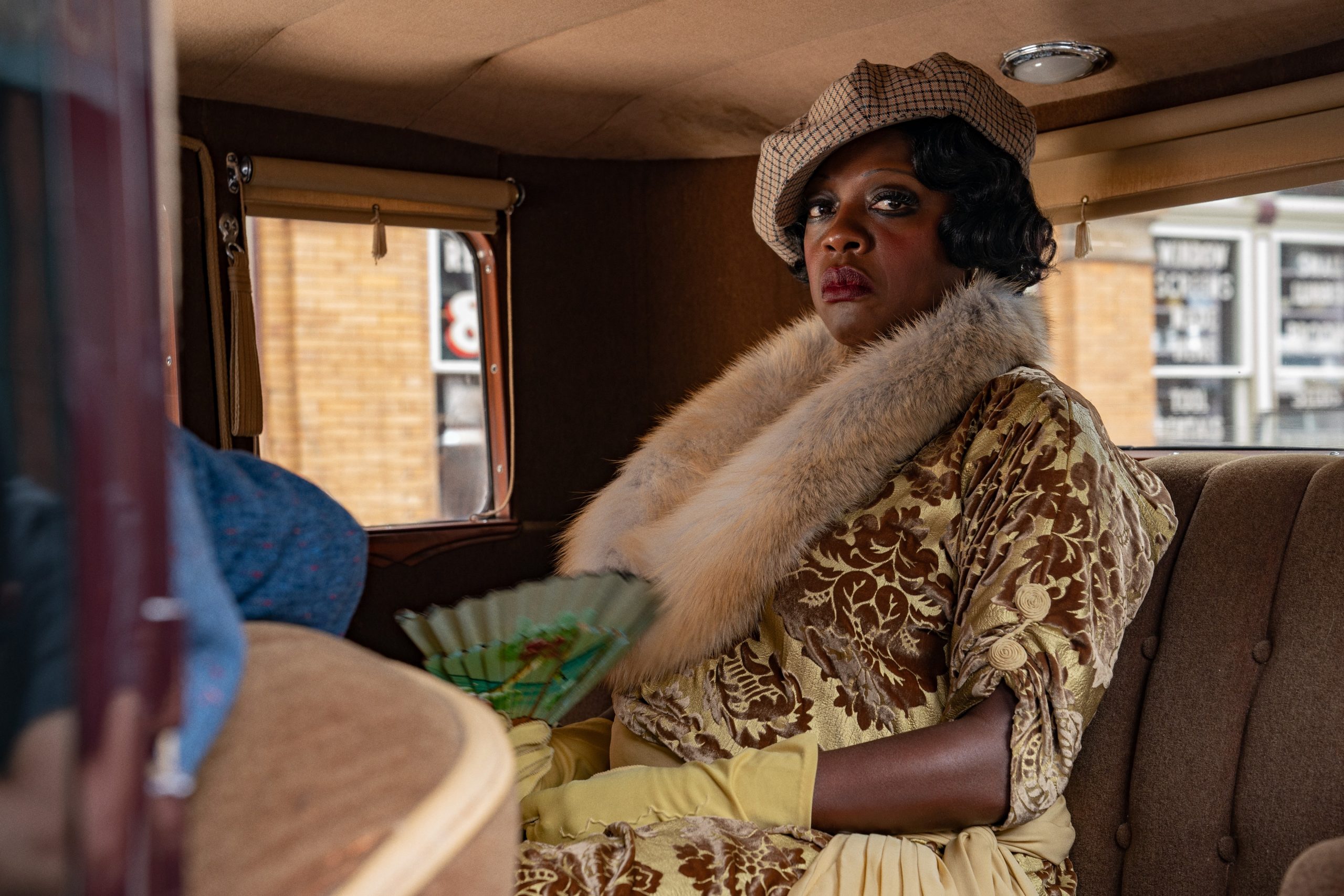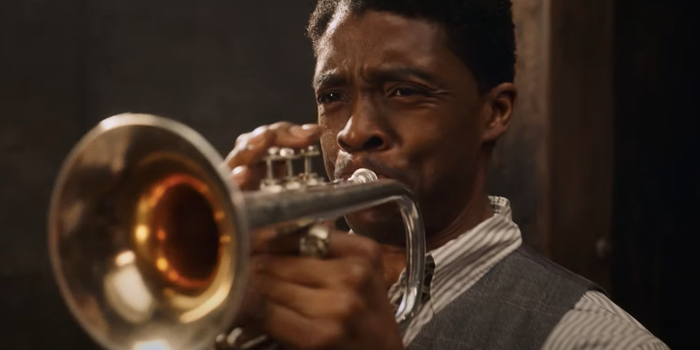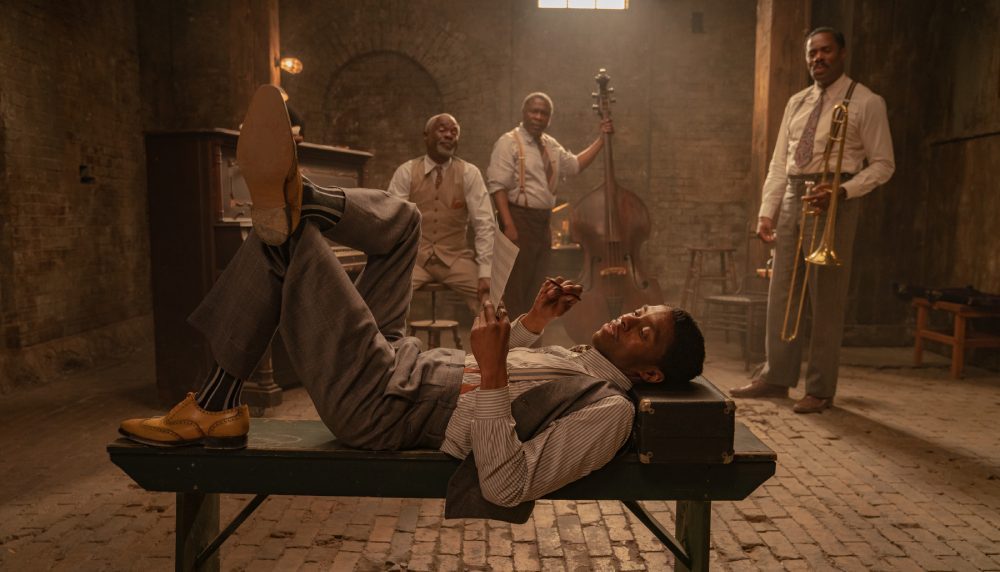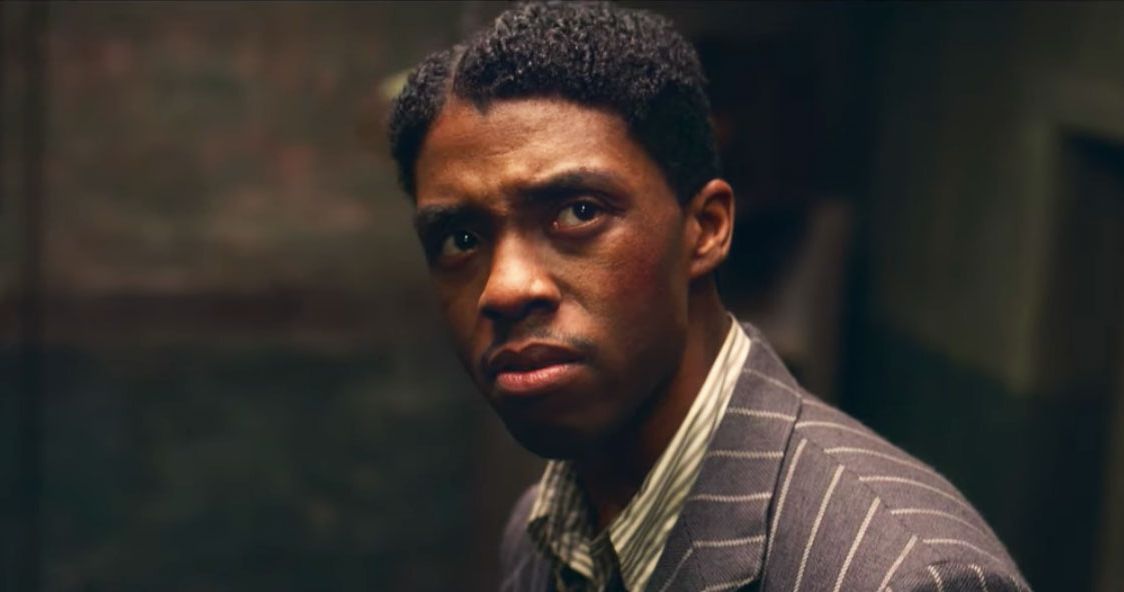Directed by George C. Wolfe, ‘Ma Rainey’s Black Bottom’ is a drama that looks at the experiences of the African-American community in the 1920s. With an ensemble cast that includes Viola Davis and the late Chadwick Boseman, the events unfold over a single afternoon to paint a poignant picture. So, what is the climax all about? Hold tight, because there’s a lot to discuss. SPOILERS AHEAD!
Ma Rainey’s Black Bottom Plot Synopsis
Dubbed the “Mother of the Blues,” Ma Rainey has a recording session in a studio in Chicago one afternoon. Not only does she show up late, but she is in constant conflict with her manager, Irvin, and the producer, Sturdyvant. After all, the legendary artist knows that they only want her voice. So, she makes sure that she calls the shots.
The band arrives before she does and waits in another room. Cutler, Slow Drag, and Toledo are more practical and wise than the ever so ambitious trumpeter, Levee. Not only does he have his eyes set on Ma’s girlfriend, Dussie Mae, but he also wants to form his own band and release new music. Over the course of the afternoon, the bandmates learn more about each other’s pasts, and as the story progresses, conflict is rife.
Ma Rainey’s Black Bottom Ending
After an eventually successful recording session, Ma compliments everyone but Levee since he played more emotionally; this threw her off her game. After an argument between the two, she fires him on the spot, and he acts quite nonchalant about it. He goes back to the waiting room and breaks the door only to find a small room without a ceiling. This is symbolic of the hope and ambition that Levee feels even though he does not have many prospects in reality.
After all, despite being closed in by his own choices, he seems oddly confident that he can make it big if given a chance. Sturdyvant wants to give Sylvester, Ma’s nephew, $25 from the money he owes her. However, the steadfast singer ensures that her nephew is paid separately. Furthermore, Irvin begs her to sign the release forms. After some initial reluctance, she gives in. However, Ma also warns Irvin that if more hiccups happen in Sturdyvant’s studio in the future, she can always record somewhere else. Following this interaction, she leaves.

Back at the studio, Sturdyvant pays the band members in cash. When Levee approaches the producer about the original music that the trumpeter had written for him, Sturdyvant simply says that he does not like the songs enough to record them. However, the producer is willing to compensate him for $5 a pop. Even though Levee tries to convince Sturdyvant to go ahead with the deal, the producer refuses, citing different reasons each time.
Understandably, Levee is bummed out by this rejection since he had all his hopes pinned on this. When Toledo accidentally steps on the trumpeter’s expensive shoes, the latter loses all semblance of rationality, even though his bandmate apologizes to him. In a fit of rage, Levee stabs Toledo, who then dies in his arms. The rest of the bandmates are in disbelief. But if you really think about it, those shoes are also symbolic of Levee’s ambition.
After all, he spends $11 (which was a lot of money in the 1920s) on them. So when Toledo steps on them, it’s almost as if he is stepping on the trumpeter’s dreams. In the end, we find out that Sturdyvant had lied to Levee. An all-white orchestra records the very song that the trumpeter had written, and a white man sings the lyrics as well. Clearly, the producer likes the track but just doesn’t want to work with a black man.
What Could Have Happened to Levee?
After stabbing Toledo, Levee has effectively ended his career. We think that, in all likelihood, the bandmates would not have helped the trumpeter cover up the crime since they respected Toledo too much to do that. They would also have had issues with Levee’s smart mouth and temper. It seems as though Sturdyvant is the one who would have turned the trumpeter in.

Firstly, Sturdyvant’s studio is the crime scene. Then, there’s the fact that the producer has effectively cheated Levee out of work. He buys the songs for $5 apiece but will go on to make a lot more money once they release. If the trumpeter is in jail, then the entire ordeal becomes even simpler for Sturdyvant, since Levee won’t be able to contest this malpractice. Needless to say, in the absence of the Civil Rights Act, the bandmate would not have gotten a fair trial in all probability either.
Who is The Real Protagonist: Ma Rainey or Levee?

At first glance, it seems as though Ma Rainey is the obvious protagonist. After all, her name is in the very title of the film. Initially, she comes across as just another stubborn artist whose fame has gone to her head. However, as the story unfolds, we learn that this is not the case. Yes, she does have erratic requests (if you can call them that), and it’s always her way or the highway. But this is largely due to the racial realities of the 1920s. She is a woman who knows her worth and also understands that both Irvin and Sylvester choose to work with her only because she is an established artist.
When Ma says, “All they want is my voice,” she hits the nail on the head perfectly. After all, which white man in the 20s would willingly kowtow to a black woman without the prospect/promise of a hefty paycheck? She understands that their entire relationship is financial in nature. This is evident in a couple of scenes – Irvin fails to procure Coca Cola for the singer, and Sturdyvant does not want to pay Sylvester an extra $25. Their transactional relationship works because Ma knows what she is worth to these men.
She is an independent woman who was sprung to fame by the black community in the first place, and so she knows that white men are not that important for her survival. This is why she behaves the way she does with Irvin. Plus, we learn more about the nuances of racism and sexism that she faces as a successful black woman in the 1920s. On the other hand, we have the tenacious and determined Levee, who also dreams of becoming a famous musician. He truly believes that he can make it big, and his cocky attitude arises from this notion.
Levee is a talented man, but he is unable to navigate the politics prevalent in the music scene as well as Ma does. His story is one that is equally fascinating and tragic. Plus, he loves attention. At the beginning of the movie, Levee does try to take the spotlight away from Ma by stepping forward on the stage. This scene is important since it becomes clear that Levee really does think that he is all that. Furthermore, there is something to be said for the fact that he successfully remains in the spotlight until Ma directs the attention back on herself. In these respects, the two characters are quite similar.
Furthermore, the interaction between Ma and Levee in the climax really shows us that both the characters are quite comparable. Both are talented, and they know it. Furthermore, both are equally stubborn and don’t really care about the opinions of other people. Ma doesn’t want Levee to play his instrument emotionally; she wants him to stick with what they’ve always done.

But the trumpeter couldn’t care less about what the famous singer wants. When she fires him, he seems to be unaffected by it. So, whose story does the plot relay more impactfully? Is it Ma, who knows her worth and isn’t afraid to leverage her stardom for what she considers proper treatment? Or is it Levee, who exhibits a rollercoaster of emotions from start to finish? After all, a white man’s rejection causes Levee to take the life of a black man, even if it is a mistake.
Look, we get it. The afternoon is an emotional one for Levee. Not only does he reveal the traumatic details of his mother’s gang rape when he was just 8, but the afternoon also culminates in him stabbing his bandmate. He has to relive past trauma only to be rejected by the white man once again. Levee’s plight is woeful, to say the least. His bandmates make fun of him for pandering to the producer, but the trumpeter is confident that he will get the deal.
Subsequently, when everything falls apart, he is unable to contain his emotions and takes Toledo’s life. In the end, it is evident that Levee’s exultant outlook and overconfidence is the reason for his downfall. Ma would never have reacted to a situation in this manner. While the trumpeter talks a big talk, Ma walks the walk. This is the key difference between them. Ma has entertained an entire generation of African-Americans while dealing with racism and sexism constantly.
In this regard, the two characters are poles apart. Ma treats the two white men in the studio as she pleases, but it is for good reason. She knows that in this way, they will never take her for granted. Levee lacks any such foresight. It seems as though the trumpeter could have found similar success if he were as levelheaded as the singer. In the end, both of them bring something unique to the table, and Levee is as important to the story as Ma is.
Read More: Is Ma Rainey’s Black Bottom a True Story?

